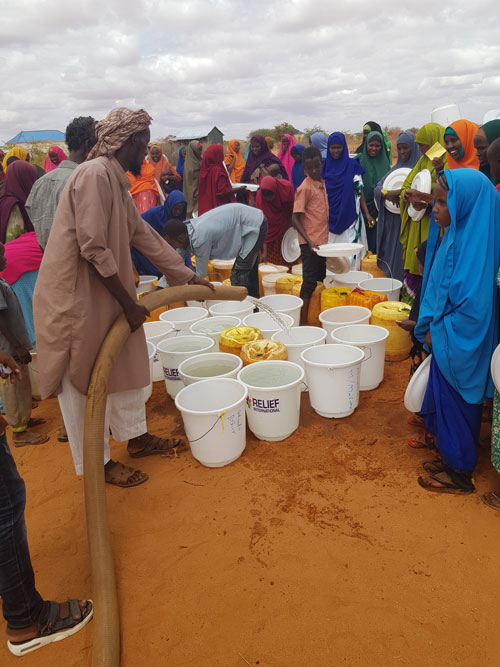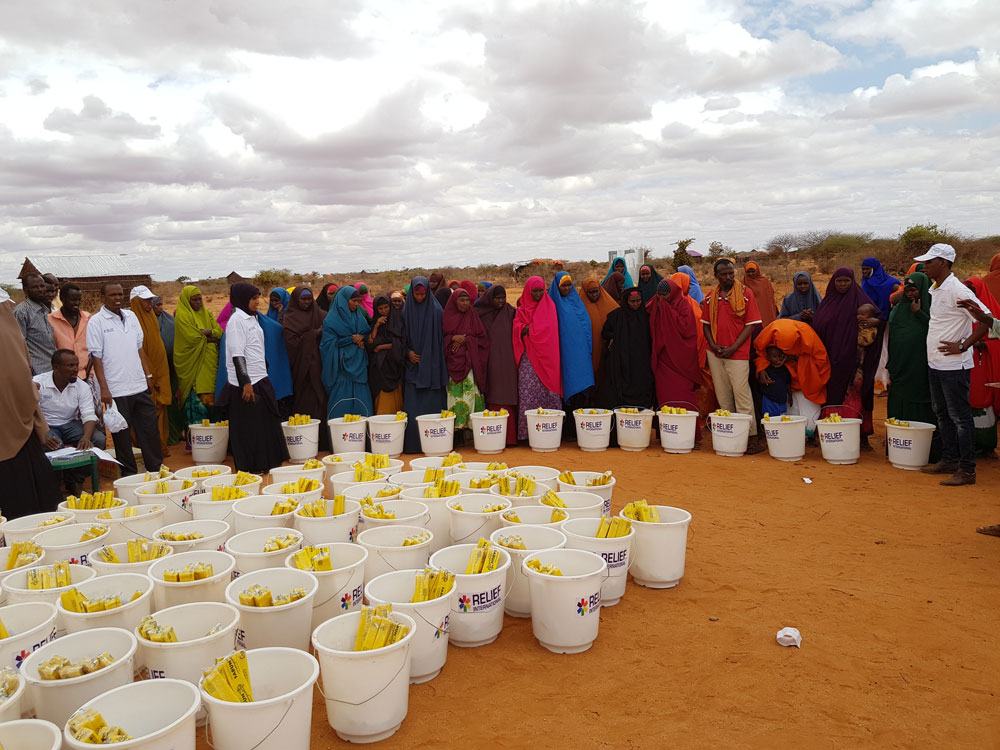Somalis rely on the annual April-June seasonal rains as a lifeline for growing food and nourishing the livestock that most of the population relies on as a principle source of income. In early 2019, the country experienced one of its driest rainy seasons in decades, and the lack of rain compounded by months of abnormally hot, dry conditions has yielded widespread crop failures and low livestock productivity.
The crippling drought has left 5.1 million people without reliable access to the food they need to stave off hunger, and fueled internal displacement as thousands flee to urban areas in search of more reliable sources of food. By summer, hundreds of thousands more people are projected to be unable to meet their daily food needs, with an estimated 2.2 million Somalis experiencing acute food insecurity — the most extreme form of hunger.
Without an immediate, large-scale intervention from donors and the humanitarian community, this crisis will continue to escalate.
Without an immediate, large-scale intervention from donors and the humanitarian community, this crisis will continue to escalate, bringing almost 18 percent of Somalia’s population to the brink of starvation.
“The devastating effects of this drought are starkly present in the communities we’re working in throughout Somalia — and growing by the day,” said Allan Freedman, Relief International’s Regional Director for Africa. “The clinics we support are seeing sharp increases in patients suffering from severe malnutrition, and the lack of access to safe water and sanitation continues to heighten the risk of outbreaks of cholera and other deadly diseases.”
Relief International’s Drought Response
Relief International has been providing critical healthcare, education, water and sanitation services to Somalia’s most vulnerable communities since 2007. We have more than 100 field staff working out of six strategically placed offices across Somalia. These teams’ community connections and firsthand knowledge of the situation on the ground equip Relief International to respond quickly to this emergency and to prepare for the possibility of worsening conditions.

To date, Relief International’s drought response has included:
- Conducting over 14,000 monthly consultations in 14 health facilities across three regions (Hiraan, Gedo and Banadir) and providing extensive health and nutrition services;
- Screening 1,600 children monthly for malnutrition as a preventative measure in three outpatient facilities in Banadir and Hiraan;
- Distributing take-home food rations to 5,133 students in the Mudug, Bari, and Nugaal regions of Puntland;
- Reaching 11,000 people with hygiene promotion in Puntland, Hirshabelle, Banadir, and Gedo;
- Providing cash-transfers to 3,823 beneficiaries through e-vouchers worth $345,000 in Banadir;
- Distributing 461,312 metric tons of food to over 5,000 beneficiaries in Banadir;
- Placing $32,000 worth of cholera treatment drugs and disinfectants and $130,000 worth of essential medicine and supplies at strategic points for use;
- Training 60 Ministry of Health staff on Cholera Treatment Center (CTC) management and acute watery diarrhoea/cholera rapid response;
- Finalizing a pre-approved list of vendors and contractors across Somalia to be able to rapidly reach beneficiaries with trucked water and other lifesaving commodities.
Mobilizing Life-Saving Support
Relief International is at-the-ready to scale up our response. We are mobilizing life-saving support in partnership with the federal and state governments of Somalia, local communities, donors and humanitarian agencies.
“Our Somalia teams have the necessary relationships, experience and expertise to help in this crisis, but are dependent on an increase in resources and donations to meet the population’s urgent needs,” said Freedman.
Donations are needed to provide Somalis with the life-saving food, water and healthcare they need to combat the escalating humanitarian crisis that surrounds them.
Additional resources will allow us to:
- Increase health and nutrition services to reach the more than 70,000 people who are severely short on food and at risk of life-threatening malnutrition in Banadir, Sool, Sanaag, Puntland, Hiraan, and Gedo;
- Truck safe water and mitigate cholera outbreaks by distributing water purification tablets to vulnerable host communities and internally displaced populations in Banadir, Sool, Sanaag, Puntland, Hiraan, and Gedo;
- Provide cash transfers to the most vulnerable households in Banadir, Sool, Sanaag, Puntland, Hiraan, and Gedo to avert further deterioration of household purchasing power.
